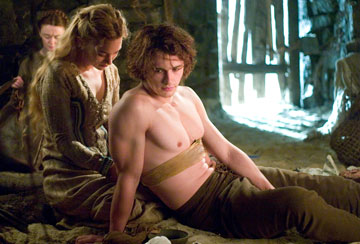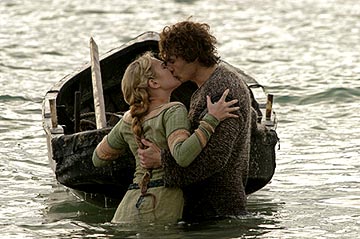

Forbidden love is the theme of Tristan & Isolde, an ancient English tale that for some reason has not made it more often into theaters. It is full of what fans of grand historical romances crave - doomed relationships, great battles, and again, forbidden love. The romance in Tristan & Isolde doesn't really work, but the film does work as a political movie. Wow, that's probably not what director Kevin Reynolds (The Count of Monte Cristo, 187) wants to hear. Tristan & Isolde takes place in the Dark Ages after Rome's occupation of England. Many small states vie for power with each other. Looming in the distance is Ireland, powerful because Rome did not touch them.
Lord Marke (Rufus Sewell, The Legend of Zorro, Extreme Ops) of Cornwall believes that the only way for England to win its battle against Ireland is to unite. He is the most powerful leader so he wants people to unite under him, but the others have other ideas. Years earlier, Marke rescued Tristan from an Irish attack and raised him as his on. Tristan (James Franco, The Great Raid, Spider-Man 2) is now a handsome, strapping young man who also is a good fighter and tactician. He dies in a battle with the Irish, and the English send his body out to see, where he washed up on the coast of Ireland. Of course, Tristan is not dead, and Isolde (Sophia Myles, Thunderbirds, Underworld) discovers him and nurses him back to health. Isolde is daughter of King Donnchadh (David O'Hara, Hotel Rwanda, Made), and the potential complications of harboring an Englishman are huge. She refuses to give her identity to him, yet the two still fall madly in love.
There is a lot to set up in Dean Georgaris' (The Manchurian Candidate, Paycheck) screenplay, and he moves things along with good efficiency. Tristan returns to a heroes welcome. Donnchadh decides to hold a tournament, where the prize to the winner is the hand of his daughter in marriage and a large dowry of money and Irish land. He believes this will cause further rifts amongst the English. Tristan vows to win the tournament for Marke, who will then split the winnings with the other English, consolidating their support. Isolde sees Tristan fighting, and when he wins, believes that she is his. The strongest emotional moment in Tristan and Isolde comes when he tells her that she is Marke's. Now the story really begins.
At the court of Marke, both know that their romance is forbidden. Isolde is wife of the future King. Tristan copes by staying away from Marke and Isolde, and it clearly eats away at him. Franco is good at showing pained characterizations, but sometimes this is all he's good at. The bond between them is hard to break, and soon they are having an illicit affair beneath the noses of everybody. Meanwhile, Donnchadh schemes to cause more trouble in England so he can finally conquer all the tribes. Honestly, this is the most interesting aspect of Tristan and Isolde. Myles and Franco never generate enough passion as a couple. Their characters go through all the motions, trying to balance their passion with the guilt they both feel towards Marke. There are lots of stolen glances and midnight trysts, but it all feels so flat and disingenuous. Reynolds does not succeed in convincing the viewer that Tristan and Isolde are dying on the inside because of their love for each other. Instead, he succeeds at showing the machinations of Donnchadh as he schemes for power. He and Georgaris put a lot of thought into the politics of the time, having characters explain their actions and exploring the consequences of various options. They top this off with some decent ambushes, battles, and a large siege, turning Tristan & Isolde into more of an action film than a sweeping romance. Well, it's better than nothing.